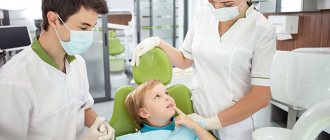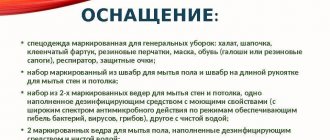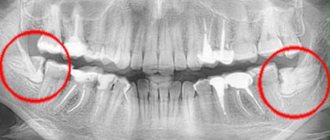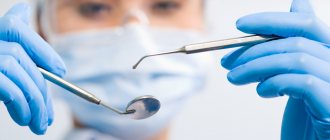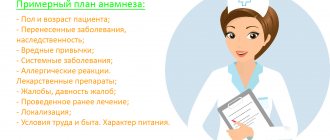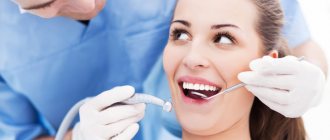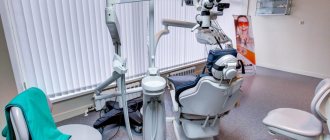In dentistry, the practice of working with four hands is the most popular and convenient format for interaction between a doctor and his assistant, therefore, in clinics engaged in this area, recruitment agencies try to recruit experienced and reliable employees not only for the position of doctors, but also for vacancies of junior medical staff. What are the responsibilities of a dental assistant, what does he do in the workplace, what rights does he have and what is the scope of his responsibility - comprehensive information in the article.
What kind of profession is a dental assistant?
A dental assistant is the right hand of any dentist. Without him, no clinic will be able to function normally, since he performs all the preparatory work in the doctor’s office, helps him at appointments, and maintains documentation. The remaining responsibilities of a dental assistant are determined by his immediate superiors - the doctor and the head of the clinic (department). Typically, these specialists provide paramedical care without interfering in the treatment process, but sometimes doctors delegate some of their own powers, instructing an assistant to perform an initial examination of the patient or carry out simple manipulations with him.
This profession is quite in demand in the labor market, because there are a lot of offices providing dental and oral cavity treatment services in our country. The responsibilities of a dental assistant in a private clinic may differ from those performed by a specialist in a budget organization. Firstly, because in each institution the doctor works with materials familiar to him and using a certain technology, and secondly, because doctors in private practice, as a rule, have more modern equipment, they modernize patient management protocols and respond faster to innovations in your field of activity.
take, intercept, hold
The assistant takes or intercepts the instrument from the doctor’s hands.
The doctor takes or intercepts the instrument from the assistant’s hands.
Typical shortcomings and mistakes in the “Take, intercept, hold” aspect
Assistant:
- does not know how to replace instruments from one to another, does not know how to hand instruments to the doctor;
- does not know or does not foresee what instrument the doctor will need at the next moment (for example, during restoration of a tooth with a composite material);
- does not come to the doctor’s aid during treatment when it is necessary to hold the patient’s cheek or tongue, matrix, or suture material;
- is in a hurry or abrupt in movements with instruments - there is a danger of injury to the patient or doctor;
- does not comment on his actions for the doctor and patient if necessary.
Doctor:
- relies only on himself, because he does not count on the effective help of an assistant or does not trust him;
- does not verbalize the request for the assistant, unreasonably relying on his intelligence.
Dental Assistant Education
In order to work as a dental assistant, you must have a secondary specialized medical education. At the same time, for some clinics it is important that the candidate graduate from any medical college with a specialty in “Nursing,” while others fundamentally require a diploma in the specialty “Preventive Dentistry.”
In addition to a diploma confirming a level of knowledge sufficient for work, the assistant must promptly obtain a state specialist certificate. Let us remind you that according to the law, employers and regulatory authorities do not have the right to demand this document from graduates of educational institutions if they completed their studies less than five years ago. A specialist certificate is not just another piece of paper, but a serious certification document that guarantees that a candidate for a vacant position in a clinic will be able to perform the duties of a dental assistant. The certificate confirms that the health worker has sufficient theoretical and practical skills.
Who can hold this position
Orders of the Ministry of Health answer the question of how one can become a dental assistant. This position is predominantly filled by nurses or nurses with secondary education. In practice, a dentist can be assisted by a paramedic or an inexperienced graduate of the dental faculty of a university with a nursing certificate. It's easier to finish nursing in college in just a few years so you can get a job in a clinic and gain experience. Paramedic or, especially, medical training specifically for working as an assistant is not needed.
College graduates often ask the question: how to become a medical assistant without experience or special training? The nursing faculty program practically does not touch upon dentistry, so graduates are sometimes not confident in their knowledge and skills. In fact, clinics often recruit nurses for further education, so with due diligence, finding a job after receiving your diploma will not be difficult. At the same time, quick learning is one of the fair requirements for candidates for employment.
4-hand operation
In advertisements for dental assistant searches, the authors tend to often indicate that the candidate must have sufficient skills and qualifications to work with a doctor four-handed. What does this mean? The doctor is forced to perform all dental procedures quite quickly: many filling materials, as well as medications, must be removed from the packaging as soon as possible and used for their intended purpose. At the same time, it is important to follow the stages of work, not to confuse anything. Sometimes the work requires illuminating the area of dental reconstruction with a special lamp, which the doctor himself cannot do. Also, the doctor often needs a quick change of working tools, attachments on drills, mirrors, and forceps. It is to quickly perform all these tasks that a dental assistant is required. The assistant’s responsibilities are to always be within the doctor’s reach, quickly respond to his requests and know the sequence of his main actions in order to be able to predict the boss’s “order.”
If the tandem is successful, and the doctor and his assistant understand each other perfectly, then their productivity increases significantly. That’s why clinics encourage working with 4 hands. The duties of a dental assistant do not require a person to show excessive initiative; on the contrary, it is important that the assistant maintain business and personal subordination with the doctor, be diligent, attentive and responsible.
Supply of tools and materials
The assistant gives the doctor: a carpule syringe with anesthetic, instruments, materials that are needed at this stage of treatment, a machine tip with a bur.
Rules for administering anesthetic:
- the assistant hands over the carpule syringe, clearly naming the anesthetic,
- the doctor intercepts the syringe,
- the assistant removes the protective cap from the needle,
- both partners verbally and non-verbally relax the patient.
Ten rules for filing instruments
- Never pass instruments over the patient's head or face.
- The assistant passes the instrument over the patient's chest so that he does not experience discomfort.
- In the case of transferring a surgical instrument (for example, forceps for tooth extraction), it is allowed to transfer it behind the patient's head.
- Always hand the instrument to the doctor with the working end towards the tooth being prepared so that the handle of the instrument is in the closest and most convenient position for gripping to the doctor’s leading hand.
- Handle sharp instruments or instruments with two handles (forceps, scissors) carefully to avoid injury to the patient or doctor.
- Avoid collision of the assistant's hands with the doctor's hands.
- The required instrument must be placed in the hands of the doctor in such a way as to ensure interception and prevent the instrument from falling.
- The instrument must be given and received in such a way that the doctor’s hand makes as little movement as possible.
- Do not pick up the instrument if it has fallen to the floor.
- If the instrument falls on the floor, then you should note to the patient that you will replace the instrument with a sterile one. Otherwise, the patient may view the instrument falling as a situation that prevents treatment from continuing properly.
Note. When the assistant puts the protective cap on the carpule needle after injecting the anesthetic, he needs to be as careful as possible and not rush, so as not to injure himself - a needle prick. Please remember that the needle can become infected.
Typical shortcomings and errors in the aspect “Supply of tools and materials”
Assistant:
- untimely or late provides the doctor with the necessary instrument or material, because he does not know or does not understand what the doctor will need next;
- does not know the technique of mixing cements, impression materials (when manually mixing dental cements and impression materials, it is necessary to strictly take into account the ratio of components determined by the manufacturer, the mixing time and the homogeneity of the resulting material);
- hands the doctor instruments over the patient's face or head - there is a danger of injuring the patient and frightening him;
- the instrument is transferred within the patient’s field of vision, which causes psychological stress;
- is in a hurry or abrupt in movements with instruments - there is a danger of injury to the patient or doctor;
- does not announce the name of the anesthetic, material, instrument to the doctor - an error may occur, so the doctor is forced to double-check the assistant by asking questions.
Doctor:
- he himself takes the necessary tools from the cassette (tray), without relying on the timely help of an assistant or without trusting him;
- does not verbalize the request for the assistant to submit the necessary, relying on his intelligence, as a result, the treatment process slows down, the doctor begins to get nervous.
Peri-medical activities of a dental assistant
The range of responsibilities assigned to a dental assistant depends greatly on the doctor himself, as well as the services he provides. Thus, general practitioners who deal with surgical and therapeutic manipulations, prosthetics, orthodontics and orthopedics have more stringent requirements for assistants. The responsibilities of dental assistants also differ due to the fact that they may be involved in the treatment process to varying degrees. Paramedical care consists of performing the following types of work:
- compliance with sanitary standards in the office, timely disinfection, weekly general cleaning (washing floors, walls, ceilings, windows, furniture and equipment);
- preparing instruments for use, disinfecting them, sterilizing them;
- cleaning the doctor’s workplace at the end of the working day, including disinfection of handpieces, turning off equipment;
- keeping records of medications, consumables and dressings, issuing them to the doctor, monitoring expiration dates and leftovers;
- maintaining documentation, registering patients, filling out various reporting forms, making entries in journals on cleaning, serviceability of equipment, sterilization of instruments.
And, of course, the main responsibilities of a dental assistant are to quickly carry out the doctor’s orders during work, meet patients at the reception desk and escort them to their chair.
Place of work
Now I work in a laboratory that is not attached to any clinic. We take orders from all over the city and region from dentists who do not have their own dental technicians. The managers, husband and wife, are dental technicians themselves. Employees are valued, encouraged to strive for development, paid for for courses, and supported in their interest in work. The atmosphere in the team is very friendly, there are no misunderstandings or resentments towards each other, and for me this is a huge plus.
The team is small - 10 people. All the guys are young, with 2-9 years of work experience.
